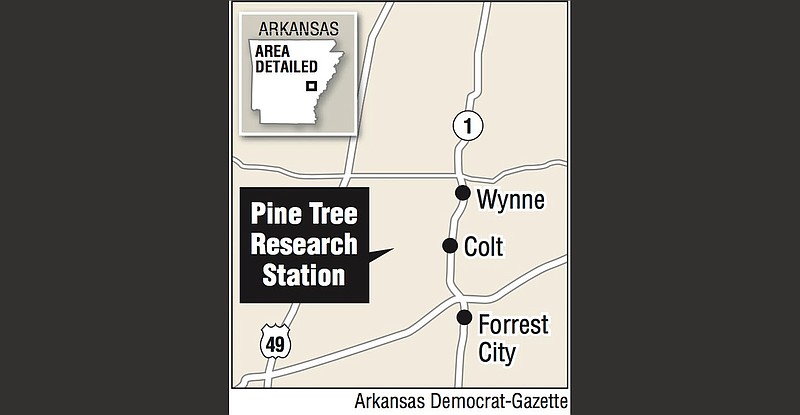A bill filed Wednesday seeks to scuttle plans by the University of Arkansas system's Division of Agriculture to sell part of its Pine Tree Research Station to a private entity.
The UA system's board of trustees voted last March to sell 6,300 wet and wooded acres of the property to a private buyer for $17.5 million, with some of the proceeds going toward construction of the Northeast Rice Research and Extension Center planned near Jonesboro.
House Bill 1694, by Rep. Steve Hollowell, R-Forrest City, would permit the sale only to a nonprofit organization that would keep the land open for public use. The bill has been assigned to the House Education Committee.
HB1694 is at least the third bill filed this legislative session related to the sale, now on hold by mutual agreement between the UA and Lobo Farms LLC, in Fisher (Poinsett County).
Senate Bill 358, by Sen. Ron Caldwell of Wynne, would place restrictions on the sale of public land valued at $500,000 or more, including the Pine Tree station. Assigned to the Senate Committee on State Agencies and Governmental Affairs, it hasn't come up for a hearing.
SB447, also by Caldwell, would appropriate $16.5 million for the new research center. Special language in the bill specifically prohibits the sale of the Pine Tree acreage. That bill is in the Joint Budget Committee.
But Justin T. Allen, an attorney for Lobo Farms, said Thursday he didn't believe legislation by the General Assembly can legally override a valid contract already agreed upon by Lobo Farms and UA.
The impairment contract clause of Article I of the U.S. Constitution expressly prohibits states from passing legislation that retroactively interferes with valid contracts, said Allen, who is with the Wright Lindsey Jennings law firm in Little Rock.
Allen noted that Lobo's agreement last year to hold off on the purchase was based on interest among some legislators at the time to find state money to buy the Pine Tree acreage and keep it open to public use. No such bill has been filed, however, and the deadline for filing such appropriation bills has passed.
If the General Assembly doesn't pass legislation to buy the property, Lobo Farms will resume the effort to close on its purchase, Allen said in a Feb. 26 letter to Mark Cochran, UA vice president for agriculture.
In a statement Thursday afternoon, the UA Division of Agriculture said, "We are concerned with any legislation that attempts to interfere with the proposed sale as it would prevent the Division from obtaining this vital funding, but we continue to visit with the sponsors of the legislation to try and address their concerns."
The 6,300 acres involved in the sale are wetlands and don't contribute to the row-crop research conducted on the research station's remaining 5,000 acres, according to the university. UA agriculture officials also said they have a fiscal responsibility to eliminate surplus land.
Hunters and anglers who've used the land for decades objected last year to the proposed sale.
The Division of Agriculture has owned the land since 1960, when it purchased the property from the federal government for $560,000, making the last payment in 1978. The deed specified that the acreage be returned to the U.S. Forest Service should it ever cease being accessible to the public.
UA has said efforts to sell the property to the state Game and Fish Commission or to one of several nonprofits failed and that Lobo Farms was the only private entity expressing an interest. Lobo's purchase price was $17,640,000, plus a $1 million donation to endow a program in waterfowl and wetlands conservation.
Because of language in the 1960 deed, congressional approval also is required for the Lobo Farms purchase to take place. "This [purchase] will go through on its own merits. That's the hurdle we have to clear," Allen said.
In the Feb. 26 letter to Cochran, Lobo Farms said it plans to spend $5 million in various improvements, such as to infrastructure and in wetlands restoration and habitat development.
Seasonal public use also would be possible, such as for summer fishing and bird watching from towers erected on the property, Lobo Farms wrote.
Lobo also said cabins and other facilities on the Pine Tree property once leased out for a state juvenile rehabilitation program could be renovated and put aside for public use.
Caldwell's bill in the Senate changing how certain state lands can be sold applies to state colleges and universities and most state agencies, boards and commissions. It requires a public notice lasting 21 days that state land could be declared surplus and possibly put up for sale.
The bill also requires the state entity to get estimates of the property's market value from three certified or licensed appraisers and hold a public hearing on a prospective sale. Depending on the entity, various legislative committees also would review prospective sales.
Current law didn't require UA to post a public notice of the Pine Tree sale or hold a public hearing. UA said it complied with all state and federal laws in marketing and selling the property.
The Arkansas Rice Research and Promotion Board has voted to provide $21.4 million for the future Northeast Rice Research and Extension Center, including an initial $4 million grant to buy the 614-acre site about 5 miles south of Jonesboro on Arkansas 1.
The board, which is funded by rice growers, also has established a $5 million endowment for the operations of the center, the UA system's first since 1957.
The $5 million endowment match would come from the proceeds of the Pine Tree sale, UA has said. Another $6 million from the sale would go toward programs in smart farming and precision agriculture. Investments in animal conservation, wetlands preservation and forestry research also would be made, according to UA.

